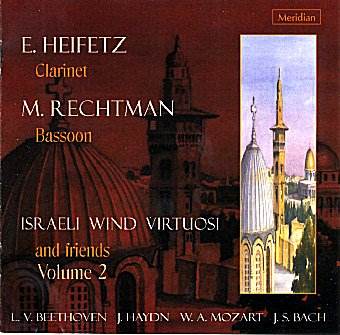ISRAELI WIND VIRTUOSI and friends, Volume
2.
BEETHOVEN Sextet in E flat, Op. 71 (arr. clarinet and string
trio). HAYDN Oboe Concerto in C,
Hob.VIIg:C1 (arr. bassoon and string trio, in F).
MOZART Andante in B flat, K315 (arr.
clarinet and string trio). BACH
Four Duets, BWV802-5 (arr. clarinet and bassoon).
Chorale Prelude, 'Nun komm' der Heiden Heiland', BWV659 (arr.
bassoon and string trio). All arrangements by Mordechai Rechtman (Haydn with
Ilan Rechtman).
 Eli Heifetz (clarinet); Mordechai
Rechtman (bassoon); Gil Sharon (violin); Gad Lewertoff (viola); Hillel Zori
(cello).
Eli Heifetz (clarinet); Mordechai
Rechtman (bassoon); Gil Sharon (violin); Gad Lewertoff (viola); Hillel Zori
(cello).
 Meridian CDE84412 [DDD]
[64'32].
Meridian CDE84412 [DDD]
[64'32].

In an attempt to augment what he sees as a relative shortage of works by
great composers for solo woodwind instruments, Mordechai Rechtman (the bassoonist
on this recording) has busied himself creating alternative versions of some
delightful pieces. That everything sounds natural and flows beautifully
throughout is a testament to his success. Beethoven's twenty-minute Sextet
(referred to on the sleeve as 'Quartet for clarinet and String Trio in E
flat, Op. 71') is positively dripping with innocuous charm. There is hardly
a cloud on the horizon for the duration, while phrasing remains light and
fluffy throughout - bear in mind that, despite its opus number, this piece
is distinctly first-period territory (Beethoven wrote it around 1796).
There is a substantial amount of reconstruction and reharmonisation as well
as arrangement in the case of the Haydn, 'in an attempt to bring the work
up to the level of Haydn's heights'. Indeed, this work may not even be by
the master, merely attributed. Whatever the case, Rechtman is the ideal advocate
of his own musicological efforts, always stylish and graceful. The interplay
between the various instruments in the Andante slow movement is particularly
worthy of mention.
Mozart's Andante, K315 was originally for flute and orchestra and may have
been written as a substitute slow movement for the G major concerto. It breathes
an easy grace, which is peacefully communicated by Eli Heifetz. I feel less
affection, I must confess, for the remainder of this disc. Bach's Four Duets
BWV802-5 were originally written for the organ (they come from the third
part of the Clavierübung), and here they surface for clarinet and bassoon
(which appear to be more closely miked than before). It is an interesting
idea, but on repeated listening they pall in a way that the earlier pieces
on the disc don't. the final Chorale Prelude (again originally an organ work)
is much more successful, the whole imbued with a sense of peace which leaves
a lasting sense of satisfaction if the disc is heard all the way through.
With the exception of the Duets, the recording is detailed without being
spotlit and is a pleasure to hear.
Reviewer
Colin Clarke
Performances

Recording

